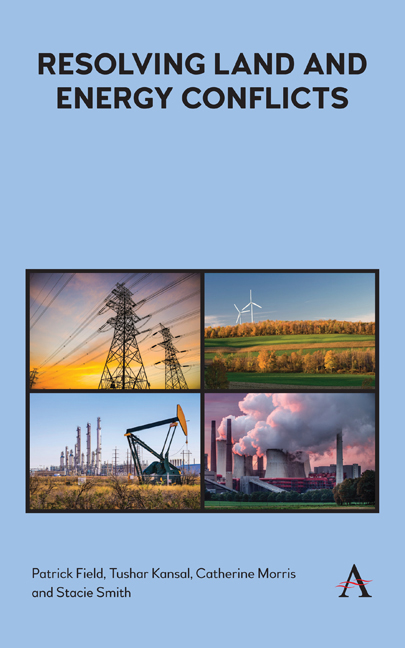Book contents
- Frontmatter
- Contents
- List of Illustrations
- About the Authors
- Acknowledgments
- 1 Introduction: The Complexity and Conflicts of Energy in the US Landscape
- 2 Land-Based Wind Energy Siting: The Not-So-Silent Wind
- 3 Nuclear Waste Siting: Getting Good People to Accept the Bad
- 4 Gas and Oil and Unconventional Shale: The New Old Frontier
- 5 The Linear Challenge: Transmission and Natural Gas Pipelines
- 6 Conclusions and Recommendations
- References
- Index
4 - Gas and Oil and Unconventional Shale: The New Old Frontier
Published online by Cambridge University Press: 29 May 2019
- Frontmatter
- Contents
- List of Illustrations
- About the Authors
- Acknowledgments
- 1 Introduction: The Complexity and Conflicts of Energy in the US Landscape
- 2 Land-Based Wind Energy Siting: The Not-So-Silent Wind
- 3 Nuclear Waste Siting: Getting Good People to Accept the Bad
- 4 Gas and Oil and Unconventional Shale: The New Old Frontier
- 5 The Linear Challenge: Transmission and Natural Gas Pipelines
- 6 Conclusions and Recommendations
- References
- Index
Summary
Introduction
A decade ago, natural gas and oil production in the continental United States began dramatically increasing as new technologies allowed for the economically viable extraction of these resources from fields that had previously been left alone or written off. This expansion in oil and gas development has had diverse and significant impacts, ranging from robust economic growth in many production areas, to a precipitous fall in global oil prices in 2015, to the introduction of the word “fracking” and the American public and fears of groundwater contamination and earthquakes that accompany it.
The expansion of production in the United States results from the maturation of two key technologies, horizontal drilling and hydraulic fracturing (colloquially known as “fracking”), that have allowed companies to efficiently produce oil and gas from shale beds and other “unconventional” oil and natural gas fields that standard production techniques could not economically exploit. As a result, natural gas and oil production reemerged in many communities in Pennsylvania, Ohio, North Dakota, and elsewhere that had seen little activity in recent decades. Equally important, however, these same two technologies are increasingly being applied to “conventional” fields to boost production, thereby intensifying development activity in areas that have been steadily producing for years, such as North Texas, Colorado's Western Slope and California's Kern County.
The surge in unconventional oil and gas production in the United States over the past decade has engendered a variety of positive benefits, including economic growth, well-paying jobs and wealth creation for many communities and workers. Significant increases in oil and natural gas production in the United States have also helped to reduce the costs of home heating and of filling a car's gas tank and have contributed to a significant shift of the nation's power generation from coal to natural gas. At the same time, however, the increase in oil and gas development has increased its impacts or potential impacts on water quality, seismic activity, air quality, habitat and the landscape and on socioeconomics. This rapid expansion of development has engendered conflict between a host of different parties, including different residents and property owners in areas hosting oil and gas development; oil and gas development companies; and various levels of government, including state, local, federal and tribal government bodies.
- Type
- Chapter
- Information
- Resolving Land and Energy Conflicts , pp. 61 - 88Publisher: Anthem PressPrint publication year: 2018



